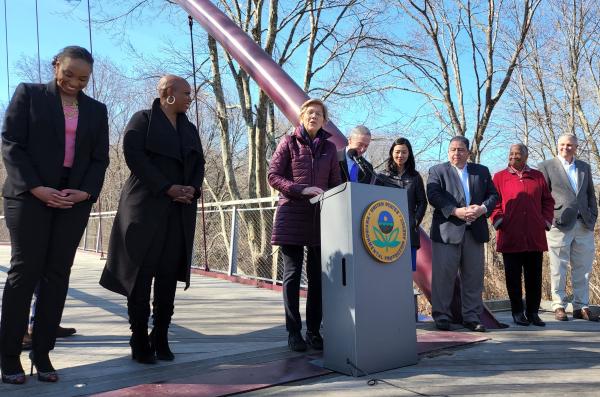March 14, 2022

From left to right, at the Harvest Bridge over the Neponset River: State Rep. Brandy Fluker-Oakley, Congresswoman Ayanna Pressley, Sen. Elizabeth Warren, Congressman Stephen Lynch, Mayor Michelle Wu, state Rep. Rob Consalvo, Vivien Morris and Ian Cooke. (Gintautas Dumcius photo)
The Environmental Protection Agency on Monday said that 3.7 miles of the Neponset River as it runs through Hyde Park, Mattapan, Milton, and Dorchester to Boston Harbor, are now listed as a national priority for cleanup as a Superfund site.
By placing that area of the river, known as the Lower Neponset (its headwaters are in Foxborough) on the list, federal environmental officials can spur and fund an investigation and cleanup of sediment and pollution within its waterways.
The sediment contains elevated levels of polychlorinated biphenyls (PCBs), which can affect human health as well as the environment.
David Cash, the EPA’s regional administrator, said the polluted stretch of the Lower Neponset was once home to mills and other industrial facilities, economic engines that brought jobs to the area but may also have contributed to the pollution now in the river.
The stretch of the river in the federal allocation starts in Hyde Park’s Mother Brook and runs downstream to the Walter Baker Dam in Dorchester’s Lower Mills area. Along the way, the channel runs between 40 feet to 300 feet wide and covers 40 acres.
The funding for the investigation and cleanup will come from a $3.5 billion pot within the infrastructure law signed by President Biden last fall. The money is geared toward the country’s multiple Superfund sites, which are considered to have the most serious uncontrolled or abandoned releases of chemicals.
Ian Cooke, the executive director of the Neponset River Watershed Association, said that people should not eat fish caught in the Neponset, and that residents should stay away from muddy areas. The Neponset typically draws people who canoe or run and bike up and down the greenway alongside the river.
A timeline and price tag for the cleanup remains elusive, since the EPA must first fully assess the level of contamination, according to Cash, who has been at the EPA for just five weeks after he left his job as UMass Boston’s dean of the McCormack Graduate School of Public Policy. He previously worked in Gov. Deval Patrick’s energy and environmental affairs secretariat.
Cash announced the Superfund listing at the steel-frame Harvest River Bridge, steps away from the river. He was surrounded by federal and local elected officials, including US Sen. Elizabeth Warren, Congressman Stephen Lynch and Congresswoman Ayanna Pressley, Mayor Michelle Wu, state Reps. Brandy Fluker-Oakley of Mattapan and Rob Consalvo of Hyde Park, and local environmental activists.
Warren called the Superfund designation the “first official step” in cleaning up the river. She noted that Massachusetts, like other states, used rivers and shores as working waterfronts, “but at the same time that development came with the steep price of harmful pollution and contamination.” She added that the public health costs were borne by Dorchester, Mattapan, Hyde Park, and Milton.
Lynch, who sat on the committee that helped draft the infrastructure law, said the earliest effort to clean up the area started in 1995, before he took office as a congressman (2001). “You can see how long things can take, but they’re so worthwhile,” he said.
Pressley said the EPA’s move is the “result of years of work” by grassroots organizers and advocacy groups. “No one should have to live, work, or go to school near a contaminated site,” she added.
About 70 percent of the country’s Superfund sites are within a mile of public housing where they pose a threat to the health of Black, Brown, and low-income communities, Pressley said. “Communities like Dorchester, Hyde Park and Mattapan that by no coincidence are home to many of our lowest income Black and brown siblings. This is what we mean when we say environmental racism.”
Wu recalled taking a bike ride through the area while she was in law school and working at the Boston Medical Center. She had previously met the Edgewater Neighborhood Association’s Vivien Morris, who encouraged her to take the ride with the Mattapan Food and Fitness Coalition.
“This is a treasure,” she said, the river behind her, and city officials will continue to be a “full partner” with advocates and the EPA in cleaning it up.


